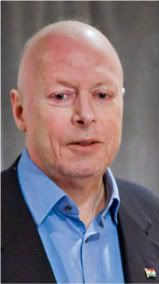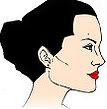Atheist Tuesday: Will Hitchens Listen?
This story, “JUST LISTEN” by Janie B. Cheaney, is used with permission from WORLD magazine. The original link is here: http://www.worldmag.com/articles/18118
While losing his eloquent voice,
Christopher Hitchens may gain ears to hear
 Christopher Hitchens is not complaining. Or rather, he is, but he doesn’t want your sympathy. Or maybe he does, but for heaven’s sake don’t pity the man! He admits he’s had a good run, and since his diagnosis with esophageal cancer in 2007 he’s been trying, with moderate success, to philosophically take the bad with the good. There’s always something, though; some loss that’s especially hard, or some regret that cuts painfully deep. In his case, it’s his voice. He can’t rely on it anymore. Sometimes he can’t make it sound at all, much less roll out in the mighty, sinewy syllables it could so easily command in years past.
Christopher Hitchens is not complaining. Or rather, he is, but he doesn’t want your sympathy. Or maybe he does, but for heaven’s sake don’t pity the man! He admits he’s had a good run, and since his diagnosis with esophageal cancer in 2007 he’s been trying, with moderate success, to philosophically take the bad with the good. There’s always something, though; some loss that’s especially hard, or some regret that cuts painfully deep. In his case, it’s his voice. He can’t rely on it anymore. Sometimes he can’t make it sound at all, much less roll out in the mighty, sinewy syllables it could so easily command in years past.
Very few could wield the clever rejoinder, the subtle twist of a phrase, the elegant slash that disarmed an opponent like Hitchens could. I’ve heard debates on atheism vs. faith that he lost on substance but won, hands down, on style. He cut himself out of every tight place and brilliantly scored with the deadly bon mot— touche! And bravo! from the young bucks in the peanut gallery. Not because they wanted their atheism vindicated by him; they wanted to be him, the epitome of cool: the height, the hair, the ready wit, the keen vocabulary, and above all the casually mastered, irresistibly accented voice.
 “When I got untethered from the comfort of religion, it wasn’t a loss of faith for me, it was a discovery of self,” he says. “I had faith that I’m capable enough to handle any situation. There’s peace in understanding that I have only one life, here and now, and I’m responsible.” From
“When I got untethered from the comfort of religion, it wasn’t a loss of faith for me, it was a discovery of self,” he says. “I had faith that I’m capable enough to handle any situation. There’s peace in understanding that I have only one life, here and now, and I’m responsible.” From  celebrities were asked the question: Is there a God?
celebrities were asked the question: Is there a God? “I don’t believe in Heaven and Hell. I don’t know if I believe in God. All I know is that as an individual, I won’t allow this life — the only thing I know to exist — to be wasted.” From the
“I don’t believe in Heaven and Hell. I don’t know if I believe in God. All I know is that as an individual, I won’t allow this life — the only thing I know to exist — to be wasted.” From the 
Atheist Tuesday: Fearfully and Wonderfully Made
I preached a sermon a couple of weeks ago based on Psalm 139. Here’s an excerpt that will prove to atheists that I am not against science at all. At the end of the excerpt you can read the sermon in its entirety or watch it or listen to it online.
Have you stopped to consider the piece of work you are?
If there are approximately six letters in an average word, the information content of that DNA molecule corresponds to about 500 million words.
If there are about 300 words on an ordinary page of printed type, this corresponds to about two million pages.
If a typical book contains 500 such pages, the information content of a single human DNA molecule corresponds to some 4,000 volumes.
“It is clear, then, that the sequence of rungs on our DNA ladders represents an enormous library of information. It is equally clear that so rich a library is required to specify as exquisitely constructed and intricately functioning an object as a human being.”
Do you know who gave that great quote?
Read More